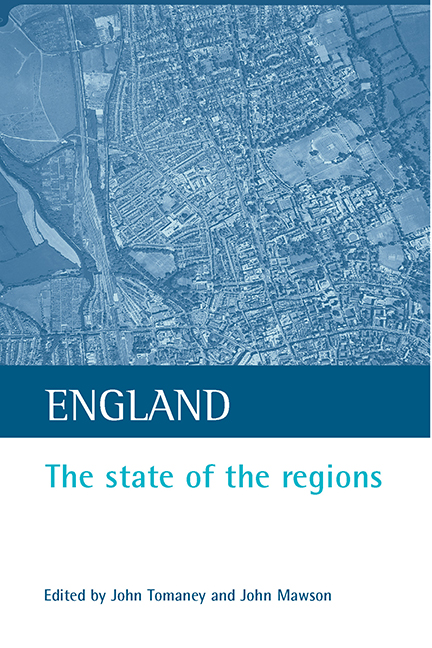Book contents
- Frontmatter
- Contents
- List of tables and figures
- Acknowledgements
- List of contributors
- one Introduction
- two Regional government in England: reviewing the evidence base
- three New Labour and the evolution of regionalism in England
- four Yorkshire (and the Humber)
- five Institutional collaboration in the West Midlands region
- six England's North West
- seven The South West
- eight Regionalism in the East of England
- nine The South East region?
- ten Regionalism in North East England
- eleven Regional strategy development in the East Midlands
- twelve The problem of regional governance
- thirteen Elected regional government: the issues
- fourteen Barnett plus needs: the regional spending challenge in Britain
- fifteen Conclusion: prospects for regionalism
- Index
- Also available from The Policy Press
ten - Regionalism in North East England
Published online by Cambridge University Press: 20 January 2022
- Frontmatter
- Contents
- List of tables and figures
- Acknowledgements
- List of contributors
- one Introduction
- two Regional government in England: reviewing the evidence base
- three New Labour and the evolution of regionalism in England
- four Yorkshire (and the Humber)
- five Institutional collaboration in the West Midlands region
- six England's North West
- seven The South West
- eight Regionalism in the East of England
- nine The South East region?
- ten Regionalism in North East England
- eleven Regional strategy development in the East Midlands
- twelve The problem of regional governance
- thirteen Elected regional government: the issues
- fourteen Barnett plus needs: the regional spending challenge in Britain
- fifteen Conclusion: prospects for regionalism
- Index
- Also available from The Policy Press
Summary
Introduction
In many respects, the North East is the key to English regionalism. It has been at the vanguard of demands for new regional institutions, and has the conditions most likely to produce support for elected regional government. The region has been a target for regional policy since the 1930s, as a result of its persistent structural economic problems, and has a tradition of institution building that has focused not only on addressing its economic problems, but has also extended into the cultural and other fields. Measures of opinion suggest that the North East has a stronger sense of regional identity than other parts of England and is more inclined to be supportive of regional government. Whether support is great enough to ensure an affirmative vote in a referendum for a Regional Assembly remains untested.
The main social and economic challenges facing the region
The North East was first awarded its label as a ‘problem region’ in the period between the two world wars. This period saw the collapse of its traditional industries, coal mining, steel making and shipbuilding. The region's economic history since then has been dominated by a struggle to adapt to structural economic change. A major expansion of regional policy in the 1960s and 1970s modernised its infrastructure, and attracted new mobile investment. An expansion of the service sector also provided jobs, and helped raise levels of female labour market participation. However, the deep recession of 1979-80, followed by low growth throughout the 1980s, saw a further decline in employment in the traditional industries, and the loss of jobs in the newer branches of manufacturing. This decline was only partly offset by service sector growth. These developments left a legacy of high unemployment, low economic participation rates, and associated social and economic problems, resulting in high levels of poverty (Hudson, 1989). In 1999 the North East had the lowest level of income per capita of any region in England. This chapter will examine the set of structural weaknesses that underpin the region's social and economic indicators.
The performance of the North East in attracting new hi-tech companies is especially weak.
- Type
- Chapter
- Information
- EnglandThe State of the Regions, pp. 137 - 146Publisher: Bristol University PressPrint publication year: 2002



